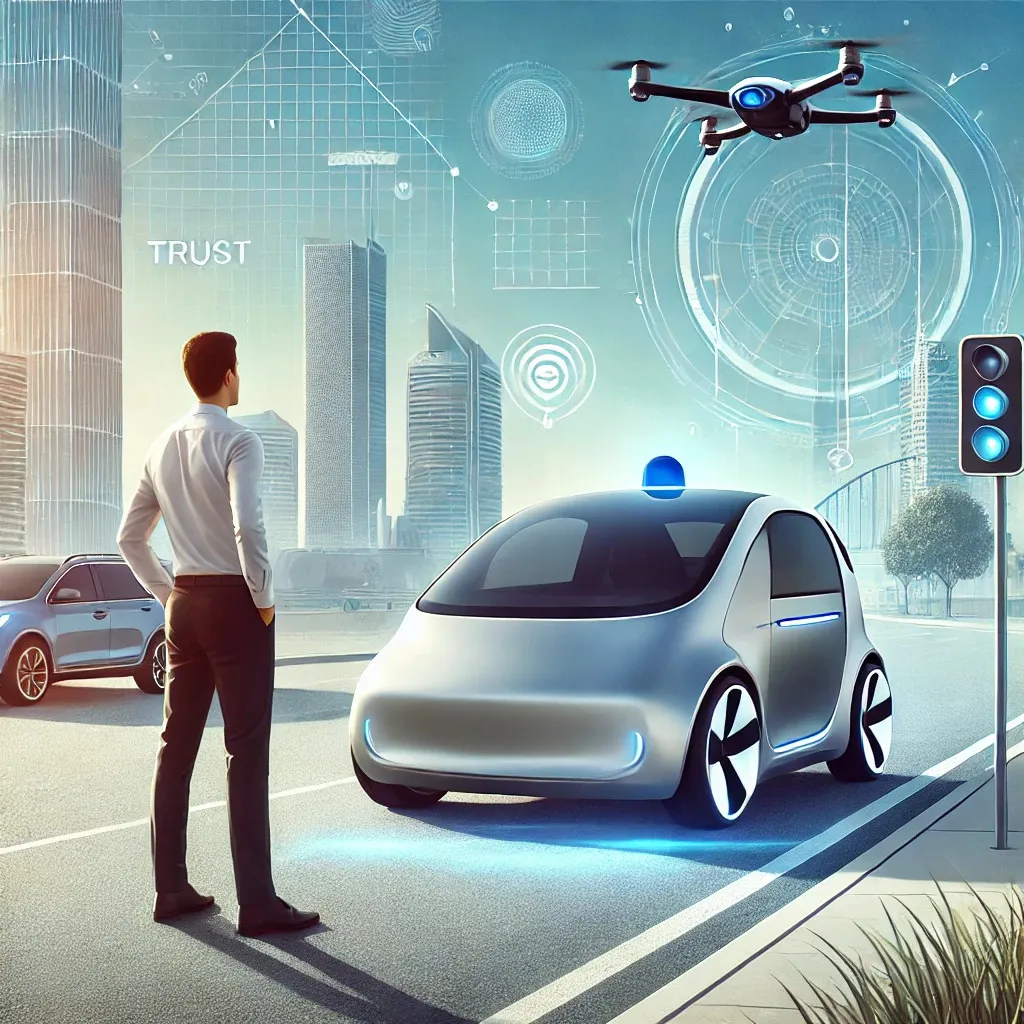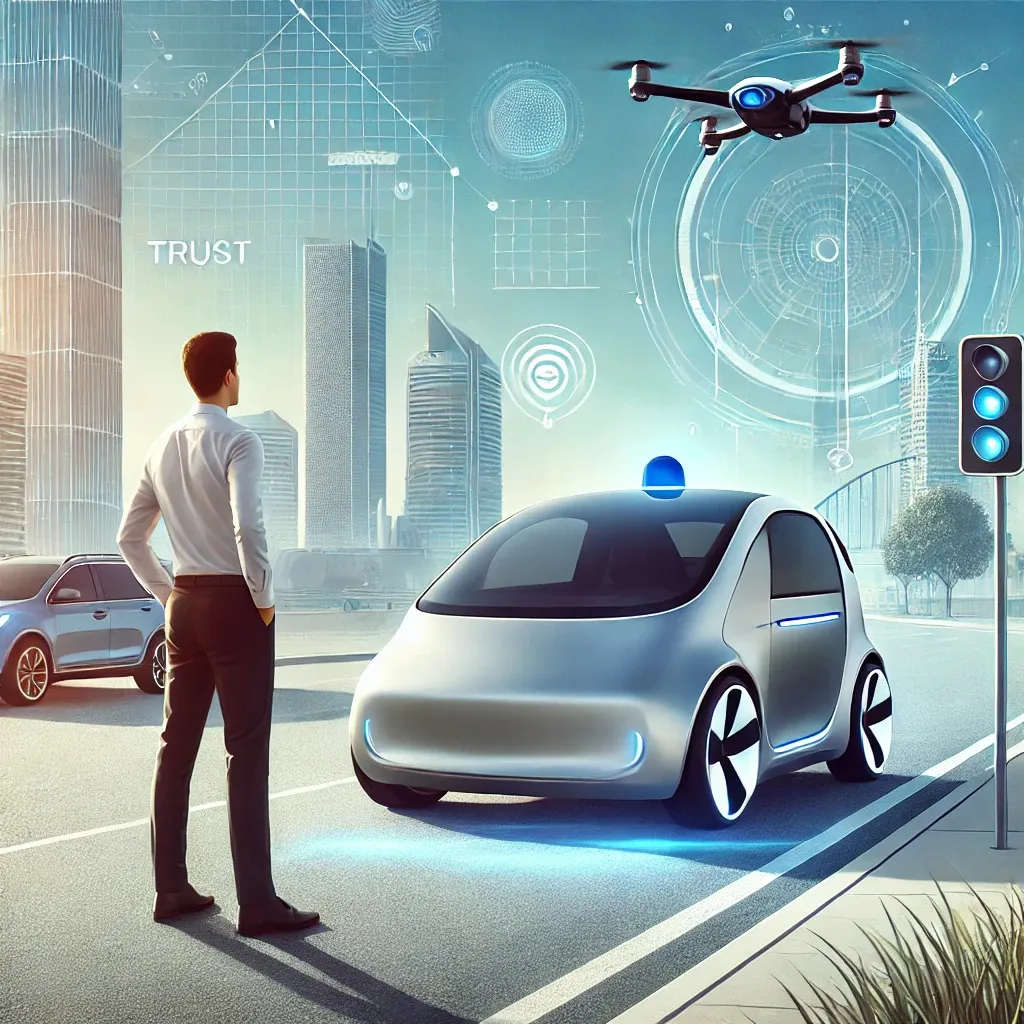March 11, 2025
Predicting Trust in Autonomous Vehicles: Leveraging Machine Learning to Model Young Adult Psychosocial Traits


Predicting Trust in Autonomous Vehicles: Leveraging Machine Learning to Model Young Adult Psychosocial Traits, Risk-Benefit Attitudes, and Driving Factors
Introduction
Autonomous vehicles (AVs) are poised to revolutionize transportation by promising safer, more efficient, and convenient travel. However, the adoption of AVs hinges largely on trust. Without sufficient trust, even the most advanced autonomous technology might not see widespread use, especially among younger generations. In this blog, we delve into a study that investigates how young adults' psychosocial traits, risk-benefit attitudes, and driving behavior can be modeled using machine learning to predict their trust in autonomous vehicles.
Understanding the Research Context
The study titled "Predicting Trust in Autonomous Vehicles: Modeling Young Adult Psychosocial Traits, Risk-Benefit Attitudes, and Driving Factors With Machine Learning" explores the role of individual characteristics in shaping trust towards AVs. The focus is on young adults, a critical demographic for AV adoption. The study leverages machine learning to identify key variables that influence trust, providing actionable insights for AV developers and policymakers.
The research is structured around three core components:
- Psychosocial Traits: Characteristics like personality, cognitive style, and emotional stability that influence behavior and decision-making.
- Risk-Benefit Attitudes: Individual perceptions of the risks and benefits associated with AVs.
- Driving Factors: Experience, habits, and attitudes towards traditional driving.
The study’s novel contribution is in its application of machine learning models to predict trust based on these three components, offering a robust, data-driven framework for understanding how young adults perceive AVs.
Psychosocial Traits and Their Impact on Trust
Psychosocial traits refer to the psychological and social factors that influence behavior. The study investigates traits such as openness to experience, neuroticism, conscientiousness, and risk tolerance, which are hypothesized to play a role in how individuals perceive and trust AVs.
For instance, individuals high in openness to experience are more likely to embrace new technologies, while those scoring high on neuroticism may be more anxious or hesitant about entrusting their safety to autonomous systems. Conscientious individuals, on the other hand, may appreciate the precision and perceived reliability of AV technology, enhancing their trust.
To model these traits, participants underwent standardized psychological assessments, and their responses were analyzed alongside their attitudes towards AVs. The goal was to establish correlations between specific psychosocial traits and trust levels in AVs, with machine learning models used to uncover patterns that might not be apparent through traditional statistical methods.
Risk-Benefit Attitudes: The Balancing Act
One of the critical factors influencing trust in AVs is how individuals perceive the balance between potential risks and benefits. The study hypothesizes that young adults who view AVs as more beneficial (e.g., safer, more convenient, environmentally friendly) are likely to trust them more. Conversely, those who emphasize the risks (e.g., system malfunctions, loss of control, privacy concerns) may be less inclined to trust AV technology.
Survey data was collected to gauge participants' risk-benefit attitudes. Questions ranged from perceptions of AV safety compared to traditional vehicles, to concerns about potential job losses in driving-related industries. The data was processed using natural language processing (NLP) techniques, which helped to quantify the participants' risk and benefit perceptions into numerical values that could be used as inputs in the machine learning models.
By applying various machine learning algorithms, such as Random Forest, Support Vector Machines (SVM), and Gradient Boosting, the researchers were able to predict trust based on these risk-benefit perceptions. The models identified key predictors of trust, such as perceived safety, control, and privacy, which were shown to have a significant impact on whether participants would trust AVs.
Driving Factors and Their Correlation with Trust
Young adults’ driving habits and experiences with conventional vehicles also play a role in shaping their trust in AVs. Experienced drivers may either trust AVs more due to their familiarity with driving-related challenges, or less due to their desire to maintain control. Conversely, less experienced drivers may be more inclined to trust AVs, seeing them as a way to mitigate their own driving shortcomings.
The study captured driving factors such as the frequency of driving, accident history, and self-reported driving skills. This data was cross-referenced with participants' trust in AVs to assess whether driving behavior influenced their attitudes toward the new technology.
For example, participants who reported frequent driving and high levels of driving confidence were less likely to trust AVs, potentially because they felt their own driving was more reliable than a machine. On the other hand, those who had been involved in accidents or reported less confidence in their driving ability were more likely to express trust in AVs, perhaps viewing them as a safer alternative.
The Role of Machine Learning in Predicting Trust
One of the key innovations of this research lies in its application of machine learning to predict trust based on the collected data. Traditional statistical methods can identify correlations, but machine learning can uncover deeper, non-linear relationships between variables, offering a more nuanced understanding of what drives trust in AVs.
The researchers employed several machine learning models, each with its own strengths:
- Random Forest: A versatile model that builds multiple decision trees and merges their results to improve accuracy. It was particularly effective at identifying the most important features that influenced trust.
- Support Vector Machines (SVM): A model that finds the optimal boundary between different classes of data. It was used to distinguish between high-trust and low-trust individuals based on their psychosocial traits, risk-benefit attitudes, and driving factors.
- Gradient Boosting: A technique that builds models sequentially, with each new model correcting errors made by the previous ones. This model was particularly useful for improving predictions in cases where the data was noisy or had subtle patterns.
The models were trained on a portion of the dataset, with the remainder used for validation. The performance of each model was assessed using accuracy, precision, recall, and the F1 score, a harmonic mean of precision and recall. Gradient Boosting emerged as the most accurate model, achieving an F1 score of 0.84, meaning it was able to correctly predict trust in AVs with high precision and recall.
Feature Importance: Key Predictors of Trust
One of the advantages of machine learning is its ability to rank the importance of different features in predicting an outcome. In this case, the researchers were able to identify the most important variables influencing trust in AVs.
- Perceived Safety: This was the most significant predictor of trust. Participants who viewed AVs as safer than traditional vehicles were much more likely to trust them.
- Openness to Experience: This psychosocial trait was a strong predictor, with individuals high in openness more likely to trust AVs.
- Driving Frequency: Interestingly, frequent drivers tended to trust AVs less, likely due to their preference for maintaining control.
- Perceived Control: Those who felt that AVs would reduce their personal control over the driving experience were less likely to trust them.
- Accident History: Participants who had been involved in car accidents were more likely to trust AVs, possibly because they saw them as a way to reduce future risk.
Implications for the Future of Autonomous Vehicles
This research provides valuable insights for automakers, policymakers, and marketers looking to increase public trust in AVs. By understanding the psychosocial traits, risk-benefit attitudes, and driving habits that influence trust, stakeholders can tailor their messaging and design decisions to better align with the preferences of young adults.
For example, emphasizing the safety benefits of AVs, while also addressing concerns about control and privacy, could help build trust. Additionally, targeting individuals with less driving experience or those who have been involved in accidents could be a fruitful strategy for early AV adoption.
Conclusion
Trust is a critical factor in the widespread adoption of autonomous vehicles, and this study offers a comprehensive, data-driven approach to predicting trust in AVs among young adults. By leveraging machine learning, the researchers were able to identify key psychosocial traits, risk-benefit attitudes, and driving factors that influence trust, offering valuable insights for the future of autonomous transportation. As AV technology continues to evolve, understanding and addressing these trust predictors will be essential for achieving widespread acceptance and integration into everyday life.
As a leading AI company in India, Indika AI is dedicated to advancing AI-driven insights that shape the future of autonomous mobility. Understanding and addressing these trust predictors will be essential for achieving widespread acceptance and seamless integration of AV technology into everyday life.


